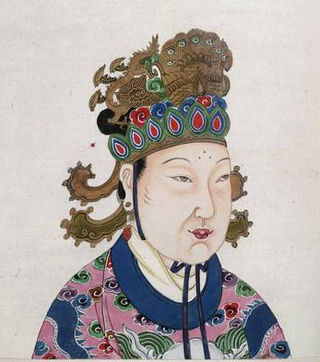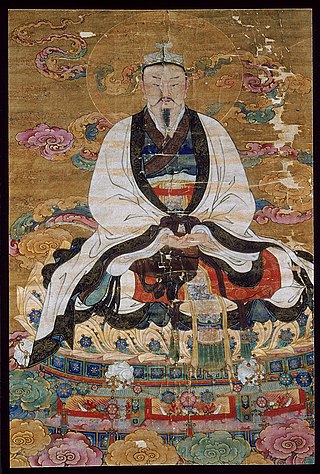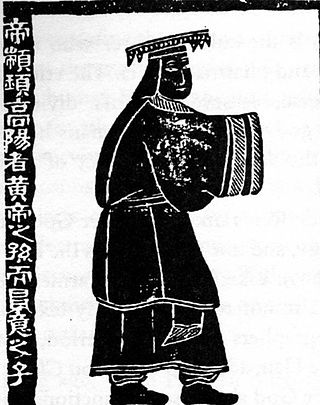See also
- Chinese proverbs in Wikiquote
| Heaven is high and the emperor is far away | |||||||||||||
|---|---|---|---|---|---|---|---|---|---|---|---|---|---|
| Traditional Chinese | 天 高 皇帝 遠 | ||||||||||||
| Simplified Chinese | 天 高 皇帝 远 | ||||||||||||
| |||||||||||||
| Mountains are high and the emperor is far away | |||||||||||||
| Traditional Chinese | 山 高 皇帝 遠 | ||||||||||||
| Simplified Chinese | 山 高 皇帝 远 | ||||||||||||
| |||||||||||||
Heaven is high and the emperor is far away is a Chinese proverb thought to have originated from Zhejiang during the Yuan dynasty. [1]
The Chinese Central Government in Beijing exercised little direct oversight on the affairs of lower-level governments,allowing much regional autonomy in the country. [2] [3] [4] [5] [6] The proverb had thus come to generally mean that central authorities have little influence over local affairs,and it is often used in reference to corruption. [1]
The saying,as it is considered in China,has multiple meanings. Often it involves something minor such as walking on the grass when no one is watching,ignoring a command because the father is far away,cutting timber when not permitted. Nowadays,it may be used to describe a lawless place far from the authorities. [7]
The original variation,"the mountains are high,and the emperor is far away",is also still heard (山高皇帝远). [8]
In Russian,there exists a directly similar proverb:добогавысоко,доцарядалекоdo boga vysoko,do czarya daleko,with a usually omitted rhyming continuation of адоменяблизко- кланяйсямненизкоa do menya blizko - klanyaysa mne nizko,which can be translated as "God is high,and the czar is far away (while I am near,so bow deeply to me)". In its short form,it is typically used to say there is no hope for external aid;while the full form describes lower echelons of bureaucracy abusing their immediate power while the authority meant to keep them in check is distant or otherwise unable to intervene.
Also,Богвысокицарьоченьдалёк(Bog vysok i tsar' dalyok,"God is on high and the tsar is very far away").
The Chinese sovereign was the ruler of a particular monarchical regime in the historical periods of ancient China and imperial China. Sovereigns ruling the same regime, and descended from the same paternal line, constituted a dynasty. Several titles and naming schemes have been used throughout Chinese history.

Huangdi, translated into English as Emperor, was the superlative title held by monarchs of China who ruled various imperial regimes in Chinese history. In traditional Chinese political theory, the emperor was considered the Son of Heaven and the autocrat of all under Heaven. Under the Han dynasty, Confucianism replaced Legalism as the official political theory and succession in most cases theoretically followed agnatic primogeniture. The lineage of emperors descended from a paternal family line constituted a dynasty.

Shangdi, also called simply Di, is the Chinese term for "Supreme Deity" or "Highest Deity" in the theology of the classical texts, especially deriving from Shang theology and finding an equivalent in the later Tian of Zhou theology.

Qin Shi Huang was the founder of the Qin dynasty and the first emperor of a unified China. Rather than maintain the title of "king" borne by the previous Shang and Zhou rulers, he ruled China from 221 to 210 BC as the first "emperor" of the Qin dynasty. His self-invented title "emperor" would continue to be borne by Chinese rulers for the next two millennia.

Wu Zetian, personal name Wu Zhao, was the first and only female emperor in Chinese history, and de facto ruler of the Tang dynasty from 665 to 705, ruling first through others and then in her own right. From 665 to 690, she was first empress consort of the Tang dynasty and then, after his death, empress dowager. Unprecedented in Chinese history, she subsequently founded and ruled as female emperor of the Wu Zhou dynasty of China from 690 to 705. She was the only female sovereign in the history of China widely regarded as legitimate. Under her 40-year reign, China grew larger, becoming one of the great powers of the world, its culture and economy were revitalized, and corruption in the court was reduced. She was removed from power in a coup and died a few months later.

The Jade Emperor or Yudi in Chinese culture, traditional religions and myth is one of the representations of the first god.

Zhuanxu, also known as Gaoyang, was a mythological emperor of ancient China.

The Ming Xiaoling is the mausoleum of the Hongwu Emperor, the founder of the Ming dynasty. It lies at the southern foot of Purple Mountain, located east of the historical centre of Nanjing. Legend says that in order to prevent robbery of the tomb, 13 identical processions of funeral troops started from 13 city gates to obscure the real burying site.

Haneunim or Hanunim is the sky God of Cheondoism and Jeungsanism. In the more Buddhist-aligned parts of these religions, he is identified with Indra. In the more Taoist-aligned parts of these religions, he is also known as Okhwang Sangje and under that name, he is a deity in the Poncheongyo religion.

Gao Huan, Xianbei name Heliuhun (賀六渾), formally Prince Xianwu of Qi (齊獻武王), later further formally honored by Northern Qi initially as Emperor Xianwu (獻武皇帝), then as Emperor Shenwu (神武皇帝) with the temple name Gaozu (高祖), was the paramount general and a minister of the Xianbei-led Northern Wei dynasty and its branch successor state Eastern Wei dynasty. Although he was an ethnic Han, Gao was deeply influenced by Xianbei culture and was often considered more Xianbei than Han by his contemporaries. During his career, he and his family became firmly in control of the Eastern Wei court. Eventually, in 550, his son Gao Yang forced Emperor Xiaojing of Eastern Wei to yield the throne to him, establishing the Gao clan as the imperial house of a new Northern Qi dynasty.

Hòutǔ or Hòutǔshén, also Hòutǔ Niángniáng, otherwise called Dimǔ or Dimǔ Niángniáng, is the deity of all land and earth in Chinese religion and mythology. Houtu is the overlord of all the Tudigongs, Sheji, Shan Shen, City Gods, and landlord gods world wide.

Dǒumǔ, also known as Dǒumǔ Yuánjūn, Dòulǎo Yuánjūn and Tàiyī Yuánjūn, is a goddess in Chinese religion and Taoism. She is also named through the honorific Tiānhòu, shared with other Chinese goddesses, especially Mazu, who are perhaps conceived as her aspects. Other names of her are Dàomǔ and Tiānmǔ.

Emperor Zhenzong of Song, personal name Zhao Heng, was the third emperor of the Song dynasty of China. He reigned from 997 to his death in 1022. His personal name was originally Zhao Dechang, but was changed to Zhao Yuanxiu in 983, Zhao Yuankan in 986, and finally Zhao Heng in 995. He was the third son of his predecessor, Emperor Taizong, and was succeeded by his sixth son, Emperor Renzong at the end of his reign. From 1020 he was seriously ill, but retained power despite this. Because of his illness, day-to-day rule of China was often placed in the hands of his third wife, Empress Liu.

Chinese traditional religion is polytheistic; many deities are worshipped in a pantheistic view where divinity is inherent in the world. The gods are energies or principles revealing, imitating, and propagating the way of heaven, which is the supreme godhead manifesting in the northern culmen of the starry vault of the skies and its order. Many gods are ancestors or men who became deities for their heavenly achievements. Most gods are also identified with stars and constellations. Ancestors are regarded as the equivalent of Heaven within human society, and therefore, as the means of connecting back to Heaven, which is the "utmost ancestral father".

Chinese theology, which comes in different interpretations according to the classic texts and the common religion, and specifically Confucian, Taoist, and other philosophical formulations, is fundamentally monistic, that is to say it sees the world and the gods of its phenomena as an organic whole, or cosmos, which continuously emerges from a simple principle. This is expressed by the concept that "all things have one and the same principle". This principle is commonly referred to as Tiān 天, a concept generally translated as "Heaven", referring to the northern culmen and starry vault of the skies and its natural laws which regulate earthly phenomena and generate beings as their progenitors. Ancestors are therefore regarded as the equivalent of Heaven within human society, and therefore as the means connecting back to Heaven which is the "utmost ancestral father". Chinese theology may be also called Tiānxué 天學, a term already in use in the 17th and 18th centuries.
[In contrast to the God of Western religions who is above the space and time] the God of Fuxi, Xuanyuan, and Wang Yangming is under in our space and time. ... To Chinese thought, ancestor is creator.

The Wǔfāng Shàngdì, or simply Wǔdì or Wǔshén are, in Chinese canonical texts and common Chinese religion, the fivefold manifestation of the supreme God of Heaven. This theology dates back at least to the Shang dynasty. Described as the "five changeable faces of Heaven", they represent Heaven's cosmic activity which shapes worlds as tán 壇, "altars", imitating its order which is visible in the starry vault, the north celestial pole and its spinning constellations. The Five Deities themselves represent these constellations. In accordance with the Three Powers they have a celestial, a terrestrial and a chthonic form. The Han Chinese identify themselves as the descendants of the Red and Yellow Deities.
The Four Heavenly Ministers , also translated as the Four Sovereigns, are four of the highest sky deities of Daoism and subordinate only to the Three Pure Ones. They assist the Three Pure Ones in administering all phenomenon of the universe.
Emperor at home, king abroad was a system of conducting relations between states within the Chinese cultural sphere. Rulers of lesser regimes would adopt the title of emperor and/or other imperial titles domestically, and adopt the title of king when dealing with the dominant Chinese regime. Instead of using the styles Imperial Majesty and Majesty (陛下), rulers of lesser realms were styled as Highness (殿下). This system was applicable to Japan, Korea and Vietnam, as well as less powerful Chinese states, among others.

Feng Shan or feng-shan, also referred to as the Feng and Shan sacrifices, was an official rite offered by the Son of Heaven to pay homage to heaven and earth. The sacrifices were usually offered at Mount Tai, the highest peak in the area, and nearby Mount Liangfu. The emperor would pay homage to heaven and earth in the Feng and Shan sacrifices respectively. Completing Feng Shan allowed the emperor to receive the mandate of heaven. The term 'feng' can roughly be translated to mean "to seal", while the term 'shan' can roughly be translated to mean "to clear away".

Ông Trời is commonly referred to just as Trời. Ông Trời is one of the most important gods in traditional Vietnamese folk religion. Later, due to the influence of Taoism, he was identified with the Jade Emperor, so he was often called the Ngọc Hoàng Thượng Đế, often referred to as Ngọc Hoàng or Thượng Đế.